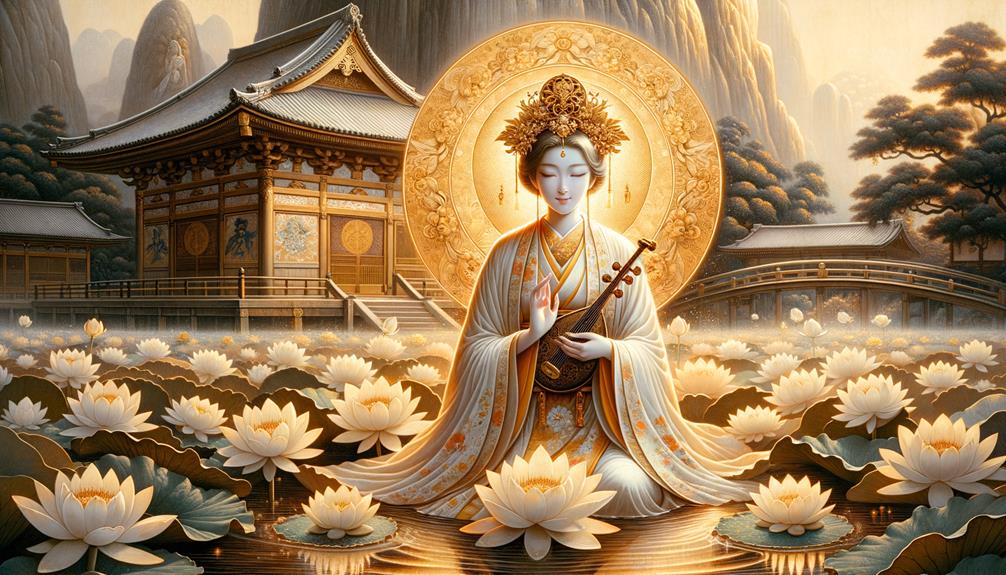Benzaiten, the Beauty Knowledge Goddess, captivates with a realm where elegance intertwines with wisdom, like sacred serpents. In Japanese mythology, her presence transcends mere tales, inviting a journey mirroring the pursuit of enlightenment and artistic mastery. Benzaiten's flowing hair and the biwa she carries aren't superficial symbols – they unlock the depths of human creativity and intellect. Her legends persist because her divine roles harmoniously blend, connecting broader mythological narratives.
Benzaiten mesmerizes with a delicate balance between aesthetics and knowledge, inspiring introspection. Her symbols evoke an appreciation for the arts and a pursuit of understanding beyond the surface level. While graceful in appearance, she represents profound truths about the human experience, encouraging personal growth through creative and intellectual pursuits. Benzaiten's enduring allure lies in her ability to guide souls towards beauty and wisdom.
Legends of Benzaiten
While many tales surround the goddess Benzaiten, her most captivating legend recounts her transforming the fierce sea dragon Hakuja into a benevolent guardian through her divine powers. This myth, deeply woven into Japanese folklore, takes place on the sacred island of Enoshima. Hakuja, once a terrifying sea dragon, tormented the locals. Benzaiten, embodying compassion and wisdom, faced Hakuja and cleansed him of malevolence, turning the dreaded beast into a protector.
Beyond taming sea creatures, Benzaiten is revered for her connection to wealth and fortune. Numerous Japanese shrines practice a ritual of washing money, symbolizing purification and hopes for multiplication. These springtime rituals invoke Benzaiten's blessings, promising financial prosperity.
Artistic portrayals depict Benzaiten playing a lute, embodying harmony between love, beauty, and wisdom. Sacred snakes, divine messengers, underscore her profound link to water and purification. Through legends and practices, Benzaiten's multifaceted nature continues guiding devotees.
Syncretism With Shinto
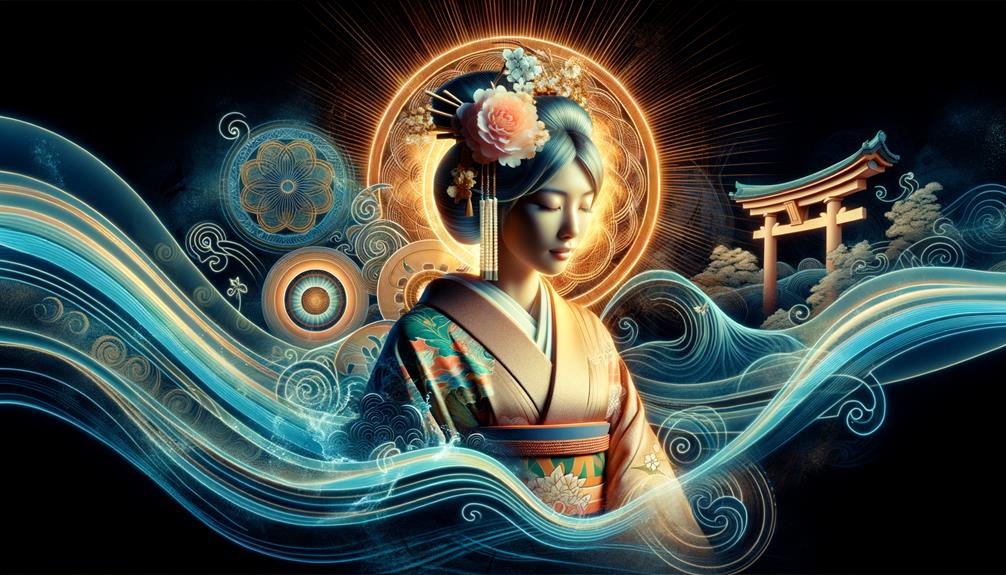
As I delve into Benzaiten's rich mythology, I encounter her fascinating blend with Shinto beliefs – a harmonious synthesis of Buddhist and indigenous Japanese spirituality. Known as Uga Benzaiten in Shinto, she represents a unique fusion of deity symbols and worship practices, reflecting Japan's adaptability in spiritual matters. This intermingling reveals the cultural alchemy that shapes and enriches one's journey through diverse religious landscapes.
Shinto-Buddhist Fusion Origins
Benzaiten's transition from the Hindu goddess Sarasvati to her celebrated status in Japan's Shinto and Buddhist faiths exemplifies cultural amalgamation's richness. Originating in India as Sarasvati, the goddess of wisdom, music, and learning, her extraordinary journey began. Her story commences in India, where Hindu devotees worshipped her. As Buddhist missionaries traveled from India to Japan in the 5th century, they introduced her essence to Japanese culture.
In Japan, Benzaiten merged seamlessly with Shinto beliefs and practices. Known as Ugaijin or Uga Benten in Shinto, she symbolizes the harmonious fusion between Shinto and Buddhist traditions. This blending manifests in numerous Benzaiten Shrines across Japan, where she represents both a Shinto deity and a Buddhist figure.
Benzaiten's integration into Japanese culture showcases diverse religious traditions' remarkable adaptability and mutual influence. Her presence in both Shinto and Buddhist practices reflects a unique cultural synthesis, enriching Japan's spiritual landscape and highlighting syncretism's beauty.
Deity Symbolism and Worship
Benzaiten's multifaceted persona weaves together Japanese aesthetic, intellectual, and musical influences into Shinto devotion. Revered as Ichikishima-hime-no-mikoto, her adaptability highlights the fluidity of Japan's spiritual practices. Shrines dedicated to Benzaiten often reside near water bodies, reflecting purification rituals where followers ritually cleanse money, believing it will attract prosperity.
The beautiful deity embodies refinement and wisdom. Her image, often portrayed holding a biwa (lute), underscores her patronage of the arts. Benzaiten's presence transcends religious boundaries, harmonizing Buddhist and Shinto beliefs into a cohesive tradition. This intermingling enriches the spiritual journey of devotees seeking her favor.
Benzaiten's iconography emphasizes her musical mastery through the biwa. Rituals involving water underscore her association with purification and abundance. Her syncretic nature, recognized as Ichikishima-hime-no-mikoto in Shinto, exemplifies the malleability of Japanese spirituality.
Through worship and symbolism, Benzaiten's multidimensional persona continues inspiring followers, blending elegance, knowledge, and the arts into a revered divinity.
Imagery and Symbols
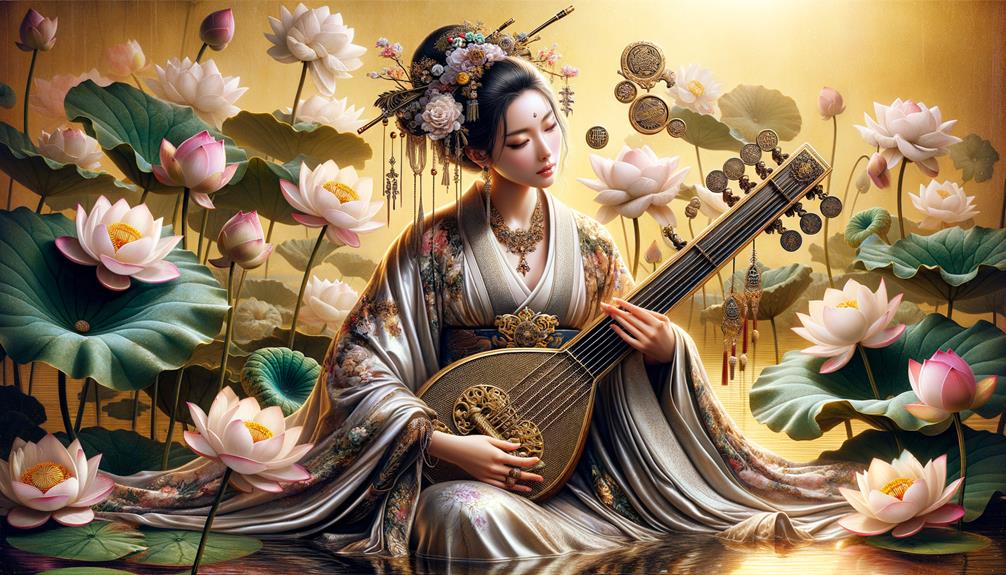
In Japanese mythology, Benzaiten captivates as the elegant goddess of music, art, and knowledge. Depicted as a beautiful woman with flowing hair, she holds a biwa (a traditional Japanese lute) and is often accompanied by a mystical serpent or dragon. These elements symbolize her connection to the arts, Shinto traditions, and divine wisdom.
Beyond the arts, Benzaiten represents fortune and love. The sacred snakes or dragons by her side signify water, divinity, and protection, adding depth to her character. Her traditional Heian-period attire reflects her regal status.
Some portrayals show Benzaiten with multiple arms holding various objects, highlighting her diverse abilities. As an archetypal hero's journey, her imagery blends beauty, wisdom, and power through her multifaceted roles and symbols.
Temples and Shrines
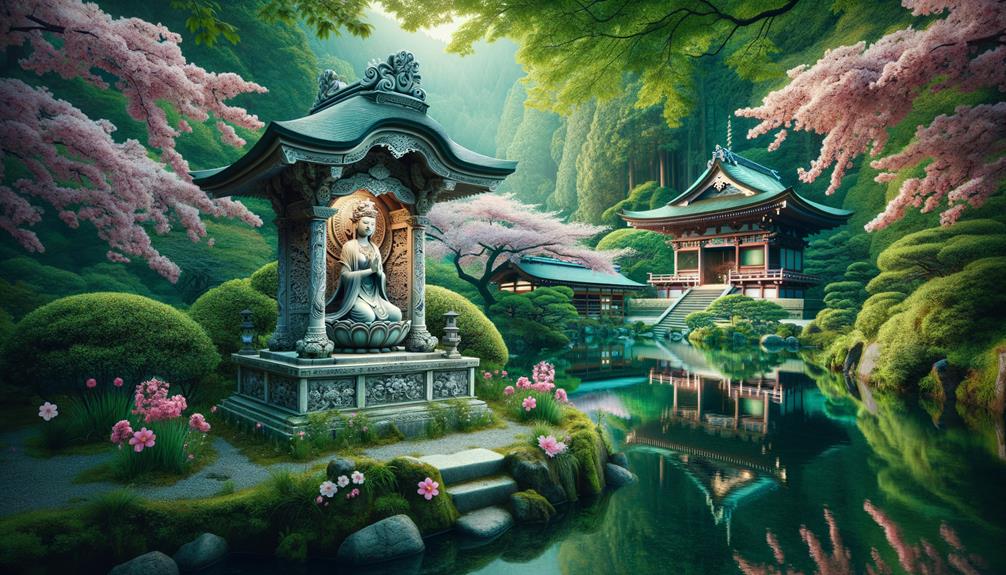
Across Japan's sacred landscapes, one encounters temples and shrines where Benzaiten's divine presence intertwines with the mortal realm. These hallowed grounds, like Enoshima Jinja and Itsukushima Shrine, beckon pilgrims and adventurers to experience the wisdom, beauty, and fortune bestowed by the goddess.
Places devoted to Benzaiten include:
- Enoshima Shrine: An island sanctuary attesting to Benzaiten's enduring influence, drawing those seeking blessings in creativity and prosperity.
- Itsukushima Shrine: This UNESCO World Heritage site, renowned for its floating torii gate, merges spiritual grandeur with architectural splendor, venerating Benzaiten amidst the sea's embrace.
- Chikubushima: Nestled on Lake Biwa, this ancient shrine holds profound historical and cultural significance, attracting worshippers dedicated to Benzaiten traditions.
Each Benzaiten shrine, from Enoshima Jinja to Tenkawa dai-Benzaiten Shrine, embodies a chapter in the epic of divine-human connections. Rituals and traditions practiced here, like purification ceremonies and prayers for prosperity, guide seekers on their journey toward enlightenment. Stepping into these temples, one weaves through narratives of mythology converging time, connecting the aspirant to the goddess's eternal wisdom.
Artistic Inspirations
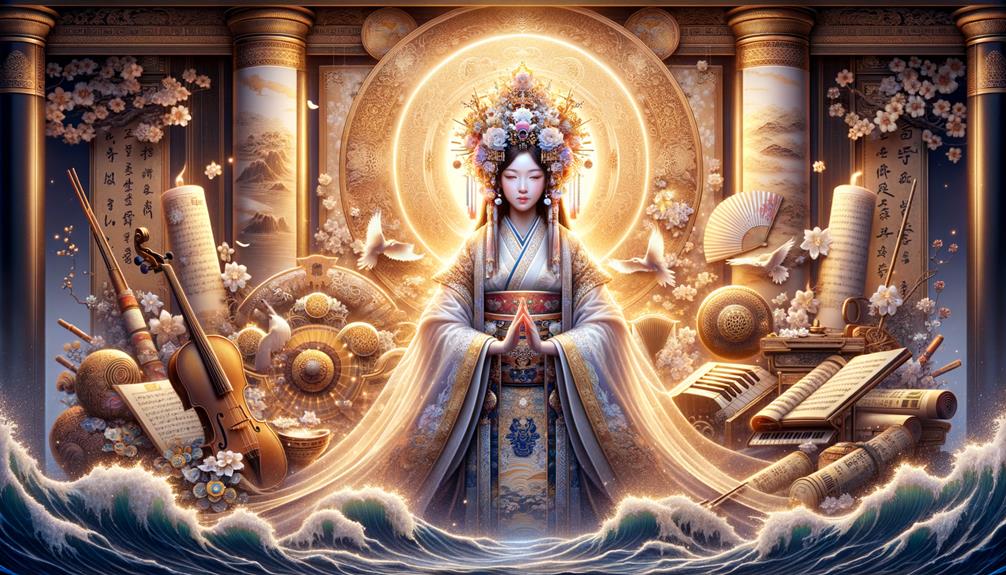
As I meander through Benzaiten's sacred grounds, I'm awestruck by how her divine essence seeps into the realm of artistic inspiration, captivating creators across time. Artistic depictions of Benzaiten reaffirm her beauty and elegance, vividly portraying her as the goddess of beauty and wisdom.
These renderings often showcase Benzaiten playing the lute, her fingers gracefully strumming the strings, embodying her close ties to music and the arts. This image isn't solely about her musical prowess; it symbolizes artistic creativity and soulful expression. Surrounding her are falling leaves, artistically intertwining love, beauty, and wisdom in a harmonious dance.
Benzaiten's influence transcends visual art, inspiring devotion and rituals in shrines and temples. Artists and worshippers seek her blessings for relationships, creativity, and spiritual growth during traditional Japanese ceremonies and festivals. Through these artistic interpretations, Benzaiten continues to guide and inspire, infusing every brushstroke and lute note with her timeless grace.
Modern Cultural Impact

In today's landscape, Benzaiten's divine influence continues to make waves in contemporary culture. The powerful goddess transcends ancient tales, inspiring creators across manga, video games, and other artistic mediums. Her timeless character takes on various forms:
- Beloved manga and anime series like Noragami and Yo-Kai Watch breathe new life into Benzaiten's symbolism.
- Digital realms celebrate her spiritual significance, inviting players to interact with her divine essence.
- Artists and musicians find inspiration in her narrative, expressing devotion through their crafts.
Benzaiten's integration in modern storytelling knows no bounds of social status or gender, fostering an inclusive spirit of unity. Her presence symbolizes the blend of religious and cultural traditions, embodying both material and spiritual prosperity. Traditional rituals where people cleanse money in her honor underscore her role as a bringer of abundance.
Benzaiten's enduring mythos showcases her unparalleled appeal, seamlessly weaving the old and new. Her vibrant presence ensures Japan's cultural heritage remains relevant, captivating audiences across generations.
Frequently Asked Questions
What Is Benzaiten the Goddess Of?
Let's talk about Benzaiten, the Japanese goddess celebrated for her artistic flair. Picture an inspired wanderer seeking creative enlightenment – that's where Benzaiten shines. Her divine essence nurtures creativity, wisdom, eloquence, and an appreciation for beauty and music. Yet, Benzaiten offers more than material indulgences; she guides souls towards balancing worldly desires with spiritual growth.
What Gender Is Benzaiten?
Benzaiten, a feminine deity cherished in Japanese culture, guides heroes with grace and insight. Her elegance and wisdom bring prosperity and love. Femininity defines Benzaiten's divine role as a revered goddess.
Who Is Benzaiten in One Piece?
In One Piece, Benzaiten serves as a sage mentor, sharing wisdom with Hiyori, the daimyo's daughter, on her heroic path. Embodying ancient storytelling grace and beauty, she guides the Kozuki Family with profound insights.
Who Is the Japanese Goddess of Beauty and Love?
Benzaiten, the Japanese goddess of beauty and love, embodies wisdom, talent, and grace. Her divine presence guides seekers on their spiritual journey, symbolizing fortune and protection. This elegant figure inspires prosperity and enlightenment.

